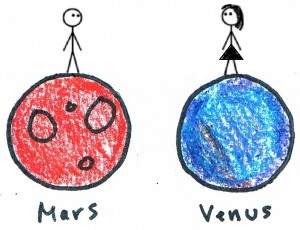Cross-posted from The Neuroethics Blog (Emory University Center for Ethics)
 A number of potentially problematic themes run throughout public discussions about sexuality in this country. One such potentially problematic theme revolves around innate sex/gender differences in sexuality. I see stories in the media almost every week about how men and women are almost diametric opposites when it comes to sexuality as a result of evolutionary pressures. In these articles, which are often reporting on scientific studies, the men are invariably sex-hungry and desperate to procreate with any available woman, while the women are invariably choosy and determined to find a “good provider” (for examples, see here, here, and here). I suspect these articles (and the studies they draw from) suffer from confirmation bias, developing elaborate evolutionary rationales to justify what seem like outdated stereotypes.
A number of potentially problematic themes run throughout public discussions about sexuality in this country. One such potentially problematic theme revolves around innate sex/gender differences in sexuality. I see stories in the media almost every week about how men and women are almost diametric opposites when it comes to sexuality as a result of evolutionary pressures. In these articles, which are often reporting on scientific studies, the men are invariably sex-hungry and desperate to procreate with any available woman, while the women are invariably choosy and determined to find a “good provider” (for examples, see here, here, and here). I suspect these articles (and the studies they draw from) suffer from confirmation bias, developing elaborate evolutionary rationales to justify what seem like outdated stereotypes.
Another such theme revolves around the determinative role of hormones in sexual desire and activity. In a fascinating (although now somewhat out-of-date) study, sociologist Amy Schalet interviewed parents in the U.S. and the Netherlands about adolescent sexuality. She found that American parents were much more likely than Dutch parents to view adolescent sexuality as driven by hormones. In addition (perhaps as a result) American parents, unlike Dutch parents, viewed adolescent desire as potentially dangerous, and they were more likely to adopt an attitude of willful ignorance about the sexual activity engaged in by their children.